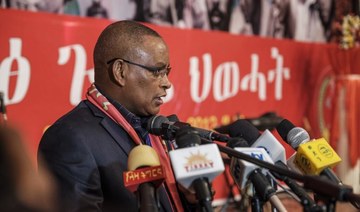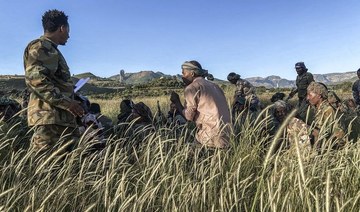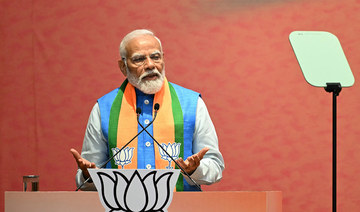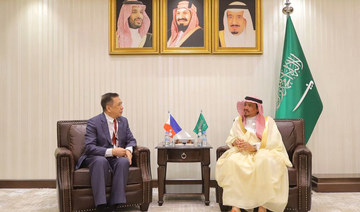NAIROBI, Kenya: The leader of Ethiopia’s rebellious Tigray region has confirmed firing missiles at neighboring Eritrea’s capital and is threatening more, marking a huge escalation as the deadly fighting in northern Ethiopia between Tigray forces and the federal government spills across an international border.
Tigray regional President Debretsion Gebremichael, in a phone interview Sunday with The Associated Press, wouldn’t say how many missiles were fired at the city of Asmara on Saturday, but said it was the only city in Eritrea that was targeted.
“As long as troops are here fighting, we will take any legitimate military target and we will fire,” he said, accusing Eritrea of sending troops into the Tigray region and denying reports that Tigray regional forces have entered Eritrea.
“We will fight them on all fronts with whatever means we have,” he said. He asserted that around 16 Eritrean divisions are fighting in what he called a “full-scale war.”
The brewing civil war in Ethiopia between a regional government that once dominated the country’s ruling coalition, and a Nobel Peace Prize-winning prime minister whose sweeping reforms marginalized the Tigray region’s power, could fracture a key US security ally and destabilize the strategic Horn of Africa, with the potential to send scores of thousands of refugees into Sudan.
The United States strongly condemned the Tigray region’s “unjustifiable attacks against Eritrea ... and its efforts to internationalize the conflict.”
At least three rockets appeared to be aimed at the airport in Asmara, hours after the Tigray regional government warned it might attack. It accuses Eritrea of attacking at the invitation of Ethiopia’s government after the conflict in the Tigray region erupted on Nov. 4 with an attack by regional forces on a federal military base there.
In a security alert, the US Embassy in Eritrea said “a series of loud noises were heard in Asmara” on Saturday night, and “unconfirmed reports indicate they may have been explosive devices believed to be in the vicinity of the Asmara International Airport. There are no indications the airport was struck.”
The Tigray regional leader would not say how many missiles remain at his forces’ disposal but said “we have several. We can use it selectively, anywhere.” When asked about targeting Ethiopia’s capital, Addis Ababa, he replied: “I don’t want to tell you, but the missiles are long-range as well.”
Officials in Eritrea, one of the world’s most reclusive nations. have not responded to requests for comment.
Ethiopian Prime Minister Abiy Ahmed in a brief statement declared that “Ethiopia is more than capable of attaining the objectives of the operation by itself.” He did not mention the missiles or Eritrea but added: ”Justice will prevail. Ethiopia will prevail!” His office in a separate statement said “we will see this operation to its end.”
The Tigray leader said he had no communication with Ethiopia’s federal government. The African Union is pushing for a cease-fire, he said, “but the prime minister is not ready to listen. He believes in the might he has.” He called this a “really messy situation which requires international intervention.”
Tigray’s heavily armed regional government broke away from Ethiopia’s ruling coalition last year, and it objects to the postponement of national elections until next year, which extends Abiy’s rule. In September it held a regional election in defiance.
Each side regards the other as illegal, and the federal government says members of the Tigray region’s ruling “clique” must be arrested and their arsenal destroyed. Abiy calls it a “law enforcement action” while his military officials call it war.
The Tigray leader told the AP he didn’t have a number of people killed in the fighting but said “a very massive displacement is happening. The fighting is happening on all fronts, in addition to airstrikes.” He added, “we have to defend ourselves, you know?”
The Tigray region is boxed in among Ethiopian forces, Eritrea and Sudan, which has closed its border but allows in refugees.
The Tigray leader said his government, the Tigray People’s Liberation Front, had no communications channel with Eritrea even before the conflict. The two sides are at bitter odds after a long and deadly border war that ended after Abiy took office in 2018.
Abiy has rejected international pleas for an immediate de-escalation.
In a separate, bloody example of Ethiopia’s growing tensions, at least 34 people were killed in a “gruesome attack” on a passenger bus in the western Benishangul-Gumuz Region on Friday, the Ethiopian Human Rights Commission said. It did not say who attacked.
The conflict could pull in more countries. A senior TPLF official, Getachew Reda, on social media asserted that Ethiopia’s prime minister “is now enlisting the support of UAE drones based in (the Eritrean city of) Assab in his devastating war against the people of Tigray.” He offered no evidence.
Officials in the United Arab Emirates did not comment. For years, the UAE has built up a military presence in Eritrea at the port of Assab and a once-abandoned airfield there, but it has since reportedly drawn down its forces after largely withdrawing from the Saudi-led war in Yemen.
The United Nations and others have warned of a looming humanitarian disaster in the growing conflict as some 25,000 Ethiopian refugees, hungry and scared, have fled the Tigray region into Sudan. Communications and transport links with the Tigray region remain almost completely severed, and millions are at risk as food, fuel and other supplies run low.
Over the border in Sudan, the refugees — roughly half of them children — huddled in makeshift tents of sheets, even umbrellas, as authorities rushed to organize assistance in the remote area and more arrivals were on the way.
“The situation is very bad at the moment,” Jens Hesemann with the UN refugee agency said in Hamdayet town, which he described as a generous but “very burdened” community.
“War is meaningless,” one refugee, Fabrik Tessafay, said. “This is genocide, it seems to me. This is genocide, to destroy Tigray and Tigray people.”
Shaken, they described being under attack even as they fled.
“Like this, all of Tigray will be killed,” said another refugee, Alem Gabril. “The (Eritrean) President Isaias Afwerki also attacked us, we were hit in the Al-Hamra region, we went to the river and we were attacked there, and some of the people died, and the others crossed into Sudan.”
One woman wailed as she was told her son had died in the fighting.
___
Ethiopia’s Tigray leader confirms firing missiles at Eritrea
https://arab.news/p36m9
Ethiopia’s Tigray leader confirms firing missiles at Eritrea
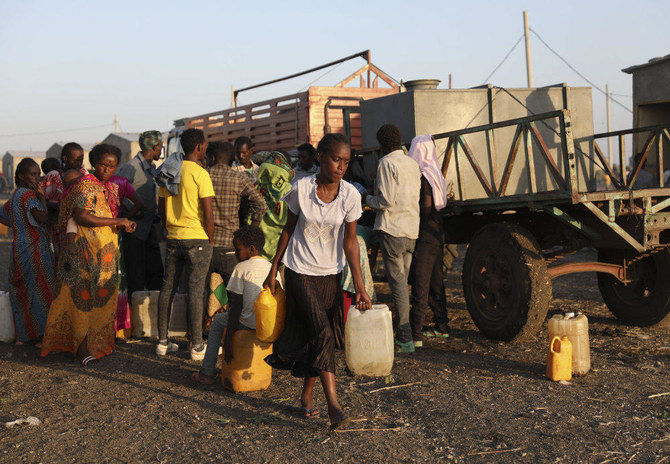
- War is brewing between Ethiopia's federal government and the Tigray, who once dominated the country’s ruling coalition
- Tigray regional leader accuses neighbor Eritrea of sending troops into the region
Top Biden official doubts Israel can achieve ‘total victory’ in Gaza

- Israel has killed more than 35,000 Palestinians, according to Gaza’s Health Ministry
WASHINGTON: The Biden administration does not see it likely or possible that Israel will achieve “total victory” in defeating Hamas in the Palestinian enclave of Gaza, US Deputy Secretary of State Kurt Campbell said on Monday.
While US officials have urged Israel to help devise a clear plan for the governance post-war Gaza, Campbell’s comments are the clearest to date from a top US official effectively admitting that Israel’s current military strategy won’t bring the result that it is aiming for.
“In some respects, we are struggling over what the theory of victory is,” Campbell said at a NATO Youth Summit in Miami. “Sometimes when we listen closely to Israeli leaders, they talk about mostly the idea of....a sweeping victory on the battlefield, total victory,” he said.
“I don’t think we believe that that is likely or possible and that this looks a lot like situations that we found ourselves in after 9/11, where, after civilian populations had been moved and lots of violence that...the insurrections continue.”
Israeli Prime Minister Benjamin Netanyahu has repeatedly vowed to achieve “total victory” against Hamas, the Palestinian militant group that attacked Israel on Oct. 7 and killed 1,200 people and took 250 others hostage.
In response, Israel unleashed a relentless assault on the Gaza Strip, killing more than 35,000 people, according to the figures of the Gazan health ministry, and reducing the densely populated tiny enclave to a wasteland.
Campbell’s comments come as Washington is warning Israel not to go ahead with a major military offensive in Rafah, the southernmost city of the Gaza Strip where over a million people who have already been displaced by Israeli attacks are taking shelter.
Likening the situation in Gaza to that of a recurring insurgency that the United States faced in Afghanistan and Iraq after its invasions there following the Sept. 11 attacks, Campbell said a political solution was required.
“I think we view that there has to be more of a political solution...What’s different from the past in that sense, many countries want to move toward a political solution in which the rights of Palestinians are more respected,” he said.
“I don’t think it’s ever been more difficult than right now,” he added.
Police aim to break up pro-Palestine protests in Amsterdam

- The Eindhoven University of Technology confirmed that there were “dozens of students peacefully protesting outside next to ten to 15 tents”
AMSTERDAM: Police moved in to end a pro-Palestinian protest at the University of Amsterdam on Monday after protesters occupied university buildings in various Dutch cities to condemn Israel’s war in Gaza, ANP news agency reported.
Earlier on Monday, a Dutch protest group said it had occupied university buildings in the Dutch cities of Amsterdam, Groningen and Eindhoven.
In a post on social media site X, Amsterdam police said the university had filed a police report against the protesters for acts of vandalism.
Police made sure no one entered the university buildings and asked protesters to leave the premises voluntarily.
A spokesperson for the University of Amsterdam confirmed the occupation and said it had advised people not affiliated with the protest to leave the building.
The Eindhoven University of Technology confirmed that there were “dozens of students peacefully protesting outside next to ten to 15 tents.”
Students in the Netherlands have been protesting against Israel’s war in Gaza since last Monday and Dutch riot police had previously clashed with protesters at the University of Amsterdam.
Students in the US and Europe have also been holding mostly peaceful demonstrations calling for an immediate permanent ceasefire and for schools to cut financial ties with companies they say are profiting from the oppression of Palestinians.
Ukraine’s first lady and foreign minister visit Russia-friendly Serbia

- Although Serbia has condemned the Russian aggression on Ukraine, it has refused to join international sanctions against Moscow
BELGRADE, Serbia: Ukrainian Foreign Minister Dmytro Kuleba made a surprise visit to Russia-friendly Serbia on Monday, together with Ukraine’s first lady, Olena Zelenska, in a sign of warming relations between the two states.
On his first visit to Serbia since the start of the Russian aggression on Ukraine in 2022, Kuleba met Serbian President Aleksandar Vucic and new Serbian Prime Minister Milos Vucevic, whose government includes several pro-Russian ministers, including two who have been under US sanctions.
A statement issued by the prime minister’s office after the talks said that “Serbia is committed to respecting international law and the territorial integrity of every member state of the United Nations, including Ukraine.”
Although Serbia has condemned the Russian aggression on Ukraine, it has refused to join international sanctions against Moscow and has instead maintained warm and friendly relations with its traditional Slavic ally.
Serbia has proclaimed neutrality regarding the war in Ukraine, and its authorities repeat that Serbia does not supply weapons to any parties. However, there are reports that Serbia has delivered weapons to Ukraine through intermediary countries. The visit by Kuleba and Zelenska, who toured the Serbian capital with Serbian first lady Tamara Vucic on Sunday, was met with criticism in Moscow. Comments by readers in the Russian state-run media such as “shameful” were published by RIA Novosti.
In what appears to be damage control, soon after his talks with Kuleba on Monday, Vucevic was to meet the Russian ambassador to Belgrade and the two were to tour a big storage facility for Russian gas that is being imported to Serbia.
Pro-Russian President Vucic has informally met Ukrainian President Volodymyr Zelenskyy three times on the sidelines of international conferences. Serbia has supplied Ukraine with humanitarian and financial aid.
Vucic has for years claimed to follow a “neutral” policy, balancing ties among Moscow, Beijing, Brussels and Washington. Although he has repeatedly said that Serbia is firm on its proclaimed goal of seeking European Union membership, under his authoritarian rule the Balkan country appears to be shifting closer to Russia and especially China.
During a high-stakes visit by Chinese President Xi Jinping to Belgrade last week, China and Serbia signed an agreement to build “ironclad” relations and a “shared joint future.”
Modi’s BJP skips Kashmir as Indian election enters fourth phase

- Millions of Indians across 96 constituencies began voting on Monday
- Ruling party is not fighting elections in Kashmir for first time in 30 years
NEW DELHI: India’s ruling Bharatiya Janata Party is not contesting elections in the Muslim-majority region of Kashmir for the first time in nearly three decades, as voting in the latest round of the national polls got underway on Monday.
The world’s most populous country began voting on April 19 in a seven-phase election that is scheduled to take place over six weeks, with ballots set to be counted on June 4.
India has 968 million people eligible to vote in the general election, where incumbent Prime Minister Narendra Modi and his Hindu nationalist BJP are aiming for a rare third consecutive term in power.
Monday’s voting involved 96 constituencies in the fourth round of polling.
While the BJP, which has been in power since 2014, and its allies are contesting every other part of India as they look to secure a majority of the 543 parliamentary seats, the party is sitting out in the northern Himalayan territory of Jammu and Kashmir.
This year marks the region’s first election since Modi’s government stripped the valley of its special autonomous status and statehood — which was granted by the Indian Constitution — on Aug. 5, 2019. The move unilaterally revoked the relevant provisions under Article 370, scrapping Kashmir’s flag, legislature, protections on land ownership and fundamental rights, sparking fears of demographic engineering in the region.
“It’s really surprising that the BJP, which claimed to have over 800,000 cadres in the valley, failed to find a single candidate. It shows that the BJP is not popular in the valley,” Sanjay Tickoo, the Srinagar-based leader of the Hindu minority group Kashmiri Pandit, told Arab News.
“I am expecting a record turnout to show the central government what (they) have done to the people of Jammu and Kashmir. This is the reflection of anger … no one is happy in the valley after the abrogation of Article 370.”
Indian-controlled Jammu and Kashmir is part of the larger Kashmiri territory, which has been the subject of international dispute since the 1947 partition of the Indian subcontinent into Hindu-majority India and Muslim-majority Pakistan. Both countries claim Kashmir in full and rule in part.
Modi said his government had been focusing on jobs and development as part of an effort to end violence in the valley, which has for decades witnessed outbreaks of separatist insurgencies to resist control from the government in New Delhi.
But after the BJP lost Kashmir’s three seats in the 2019 election, the party’s popularity slid further after it revoked the region’s autonomous status later the same year and subsequently imposed months of strict communication blockade and jailed hundreds of political leaders.
“The vote expresses not only anger but also apprehension against the anti-Muslim rants that have been going on as well as whatever they have done in Kashmir,” Professor Sheikh Showkat, a Srinagar-based political analyst, told Arab News.
Altaf Thakur, BJP spokesperson in Kashmir, said the party was still taking part in the Kashmir polls by supporting other regional parties.
“It is not correct to say that we are not fighting the election, we are playing the role of kingmaker and whichever way the cadres of the BJP will go, we will win,” he told Arab News.
“It’s not important whether we stand in the elections or not, the important thing is that we have to defeat the dynasty rulers,” he said, referring to the main contenders in the Kashmir polls, the National Conference and People’s Democratic Party.
While they are fighting each other in the valley, both parties have said they oppose the BJP and are part of the Congress party-led opposition alliance, known as India.
For some Kashmiri voters, Monday’s vote was about speaking up for themselves.
“The BJP knew that they cannot tolerate the wrath of the people of Kashmir. They fled the contest without a fight,” Aijaz Ahmed, a businessman from Srinagar, told Arab News.
“I voted today because it gave me an opportunity to express myself and tell the government in Delhi that you cannot keep us silenced. We want an atmosphere without fear and a region where our own identity is not questioned.”
5,000 Filipino pilgrims expected to fly to Makkah for Hajj

- Travelers ‘can expect VIP-like treatment,’ National Commission on Muslim Filipinos says
- First pilgrims will take off from Manila International Airport next week
MANILA: Thousands of Filipino pilgrims are set to travel to Makkah for the upcoming Hajj pilgrimage, the National Commission on Muslim Filipinos said on Monday, with the first batch set to leave for Saudi Arabia next week.
In the predominantly Catholic Philippines, Muslims constitute about 10 percent of the nearly 120 million population. Most live on the island of Mindanao and the Sulu archipelago in the country’s south, as well as in the central-western province of Palawan.
The commission said that nearly 5,000 Muslims had confirmed they would travel to Saudi Arabia to perform the Hajj pilgrimage this year.
“We have already processed 96 percent of the pilgrims,” Zainoden Usudan, chief of Hajj operations at the NCMF’s Bureau of Pilgrimage and Endowment, said.
“They can expect VIP-like treatment, allowing them to fully concentrate on their pilgrimage.”
Officials from the commission have been working hard to ensure that the difficulties faced by pilgrims last year will not be a problem this time around.
“This time, we are making sure that food will not be a problem,” Usudan said, referring to problems with delayed meal deliveries in 2023.
He said the commission was working with a service provider in the Kingdom that had contingency plans for all aspects of the trip, including transportation.
The first Hajj flight from the Philippines is set to take off from Manila International Airport on May 23.
One of the five pillars of Islam, this year’s Hajj is expected to run from June 14-19. Many pilgrims extend their stays to make the most of the once-in-a-lifetime opportunity to fulfill their religious duty.




